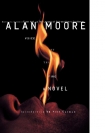Voice of the Fire, Alan Moore [year 2 reading books .TXT] 📗

- Author: Alan Moore
Book online «Voice of the Fire, Alan Moore [year 2 reading books .TXT] 📗». Author Alan Moore
The women are another matter. Though with bitterness aplenty of their own they carry out their timeless work and seem to all intents as if they dwell apart from our hot world and tread the byways of some other, female land; one unaffected by the thrust and surge of man’s enthusiasms, Empires or revolts. They bake the bread. They clean the clothes and bring forth babies they may smack and kiss. Between our wars we go to them and suckle at their fond indifference, their abiding constancy, these mothers; mothers once or mothers yet to be. These sauce-splashed deities.
Thus made divine, their desecration is at once made sweeter to the thoughts, and to man’s private sensibilities.
Skirting some rut or fissure in the road, the coital lurching of the carriage is now made more urgent and erratic, groaning like a harlot’s headboard as it bucks and jolts towards its shuddering conclusion, some fantastic spend of horseflesh, wood and iron. Amidst this jostling, the girl-child sat across from me has fetched her knee a clout upon the carriage door, so that her mother is now called upon to comfort her.
She does so in a strange, soft pigeon-murmur where what sense the words may have is not so soothing as her lapping, ebb-tide voice itself: ‘Ooh, there, what have you done now? Hurt your knee? Ooh, my poor darling, where? Let’s see now . . . Ooh. Ooh, never mind, the skin’s not broke although you’ll have a fine old bruise there, won’t you? Ooh, yes. Yes you will. A fine old bruise.’
These old, placatory rhythms lull the child, each dovecote ‘Ooh’ a drop of balm; a jig of oil to smooth the creased and choppy waters of her brow, where it is visible below the black rim of her little bonnet. Soon, the road beneath the coach becomes more even and the child falls back into the fitful doze with which she has elected to pass by the time that yet remains before we come to Kendal.
Though its bound-up majesty may not be glimpsed beneath the solemn, rigorously fastened hat, I know her hair is chestnut red and long, so that it falls about her waist when it is not wound tight and crucified by bodkins. She’s named Eleanor, although her mother for the most part seems to call her Nell, which is to my mind not so pretty. Both of them are come from further North, near by Dundee, to lodge with some old dame who has a room for rent outside of Kendal. Last night, when I first met with the pair there at the coach-inn where we each had paused upon our different journeys to a common destination, I was made acquainted with the facts of their predicament.
Her husband only recently passed on, young Widow Deene (such is the mother’s name) has come with Eleanor down to the Lakelands where a lady-friend of hers had vouched that she may find employment as a seamstress. Having spent such meagre savings as she had upon the journey here with but a little over for her first week’s rent, the luckless, lovely little thing has gambled much upon her friend’s advice and frets, now it is too late, upon the wisdom of her chosen course. Thus it would seem we both hope to have business waiting for us when we reach our destination, whether shirts to stitch or men to hang.
The widow’s bosom falls and rises, falls again, with its imagined whiteness hid neath buttoned black only to shine more dazzling and more livid in my thoughts. A scree of freckles, there across the steep ridge of her nose. Her pale, worn hands rest in her lap and cup her secret warmth.
It was the daughter that I met with first, and in a manner such as to occasion quite a start in me. I came upon her half-way up the coach-house stairs, stood with a narrow, westward-facing window at her back, afire with sunset all about her rim; less like a child than like some spirit of eclipse. I saw her and I stopped and gasped, so much did she remind me of another child, upon another stair, one that I had not seen but only heard of, years before.
Francis, the sole fruit of my union with Lady Nicholls, had regrettably become involved in dealings with John Dee, the famous charlatan who lived at Mortlake, near to Richmond. Called upon to visit Dee’s house overnight, he saw some few things it were better that he had not seen, yet nothing he had witnessed would come to perplex him half so much as having happened on a small girl standing half-way up the stairway of that dreadful doctor’s house, a western window spilling ruby light behind her. Later, having learned there were no children in the house save for Dee’s full-grown daughter, Francis came to be convinced that he had seen no mortal infant, but instead some spectral waif lost on her way to Paradise. His voice and hands both shook to tell me of it and so vivid was the picture he described it was as if I had myself met with the little wraith-girl, standing dark against her sunset. Thus last night, when I encountered Eleanor, lit just the same upon the coach-house landing, I was for a moment seized by fear of things I had thought put away with childhood, and I gawped at her with what must have appeared a fearful countenance until she spoke.
‘Oh, Sir,’ she said, ‘I do hope you are kind. I’ve played outside and left my





Comments (0)